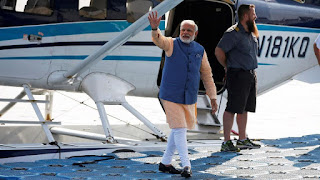The periodical columns in newspapers are often categorised as personal journalism. Blogs are more personal, more of a mood piece - where the personality of the writer could be a key element.
On this backdrop, let me discuss about a fresh blog as part of my offerings as the Republic Day musings. This is the third in the series since 2016 as I try to share very personal views about contemporary setting in and around the country and its socio-political context on a day of such national importance. Last few weeks and months had revolved Narendra Modi, Gujarat polls, soft-Hindutva polity of Rahul Gandhi and a rather unwanted controversy involving highest court of the land. So let's take a few of these - step by step. In my previous blog I have dealt with judicial crisis and hence the focus would be on other issues. With regard secularism and soft-Hindutva politics, Indian polity has undergone multi-fold changes in terms of content and also the resultant. The term ‘secularism’ has been probably first used in Europe toward the middle of the 19th century wherein an underline theme was given that public institutions should not be religious. That is they should be ‘secular’. In simpler sense – church and state apparatus ought to be different. Well, this could be a Christian sense – but it travelled into Indian politics laying emphasis that one person’s religious practice or identity had nothing to do with his her public standing vis-a-vis government apparatus. A man could be irreligious also – if Marxists intellectualism is to be understood. But in course of time – it was used to ‘garner’ minorities – and especially Muslim votes. Without going into details on which leader or which party is to be blamed; it ought to be understood in a very simple sense that soon politicians pushed languages like Urdu even in states like Kerala and West Bengal – where locals hardly spoke or understood it and it was presumed that this can appease Muslims. This was in later years – dubbed by the likes of L K Advani, a chief architect of Hindutva-politics, as ‘appeasement politics’.
By 2014 – after Congress strength in Lok Sabha was
reduced to all time low, an internal panel of Congress party headed by
versatile A K Antony ‘rightly’ diagnosed that the Congress party was also being
described as ‘anti-Hindu’. In a country where nearly 80 per cent are Hindus –
the Congress was really pushed into the second fiddle. ‘Sickularism’ was a tag
given to the Congress and thus some corrective and drastic steps were
necessary.
The Gujarat elections in 2017 provided an ample
opportunity and the corrective step in purely political sense made lot of
sense. Being ‘secular’ and someone believing in pluralism did not mean one
ought to turn anti-Hindu! Rahul Gandhi precisely did that in the run up to the
elections in Gujarat. This adds a new feather in his cap. May be !
But what is more important to debate is WHY the real ‘secular polity’ – as ideally desired – has not succeeded in India so far? The general approach of administrations – irrespective of party affiliations and states – towards the problem of communal tension and disturbances - has been like ‘fire brigade’. After the riots, police would appear on the scene and once the riots have been doused – they would return to the barracks and as if would wait for the next conflict to emerge. In between – the political class would do their business and garner votes !
To discuss these, we ought to examine two different questions as well. What has ‘secularism’ done to Indians? Or – What has Indians done to the secularism?
To answer these questions – we need to understand the significance of pro-Hindutva and hard or soft Hindutva politics. Some have tried to answer these questions by laying the blame on specific doctrines! True, it is always easier to blame others. Who did this to us? – is therefore a common human response. But 'soul searching' is vital and perhaps the compulsion of vote-game has started drawing the likes of Rahul Gandhi and Mamata Banerjee to play so called 'soft-Hindutva'. In both the instances, these are crucial as anti-Modi brigade have started realising that you cannot ignore Hindus for long and rule over Indians. For that matter in Tripura, even the Marxists - the original copy right holders of 'Muslim appeasement' have been talking about Ramayana, Pandavas and so on.
This is one principal impact of the Moditva phenomenon -- and hence the die hard Modi-detractors are looking for new avenues every day to slam him.
Was judicial crisis part of that endeavour, one cannot answer this question either way. The anti-Modi brigade has not given up their agenda and they will not. But each time they try to build up a mountain out of a mole hill, things go the other way. Actually, Prime Minister Modi is found to be a smart operator and often a gamechanger for a game - where he is the referee and also the ultimate winner.In political sense, Rahul Gandhi has led his party to corrective path when he shed the shyness of being associated with temple. There is nothing to be apologetic about Hindu identity. The Congress party – for all practical reasons – need not be shy about doing politics with 80 per cent Indians. The ‘inclusive’ politics cannot actually be crafted keeping the majority community away from it. The misadventure of terminologies like ‘saffron terror’ should be forgotten as bad dreams.
The party has paid heavy price for using words like ‘Osamaji’ for a dreaded terrorist. It has also gained nothing by stating that country’s the ‘minorities’ have the first right to national resources. It is not that such politics were not tried in 2002 or in subsequent polls in Gujarat. But such efforts then did not yield results. However, the elections of Gujarat 2017 paid in dividends and it clearly suggested that Congress should stick to the new roadmap.
In 2014 and some state elections after that, Congress lost the support of ‘moderate Hindus’ and - post Gujarat - it is presumed that this section can be won over.
However, the real diagnosis is not yet happening about the malady. Since mid December when Rahul Gandhi took over as Congress chief, everyone seems to be waiting in the wings eager to know the real Team Rahul. The delay is no longer a puzzle, it leads to frustration.
Meanwhile, the BJP's onward march continues notwithstanding Gujarat.
 |
| The Campaign Star |
The coming elections in three north eastern states would many things clear. But as far as the Republic Day of 2018 remains, Modi remains ahead --- the ASEAN-India Commemorative Summit was a totally a new and uncharted roadmap tread by him. How much it would bring in dividends remains to be seen though.
The Padma Shri Award for individuals from each ASEAN member nation will find him new fan following -- another factor that could lead to stomach pain to his detractors.
The Governance is not about 'glory' of ruler, Pranab Mukherjee had propunded in his last address on the eve of Republic Day on January 25, 2017. But what's the power -politics all about - if there is no glorification of the man - who has that 'power'.
ends






















